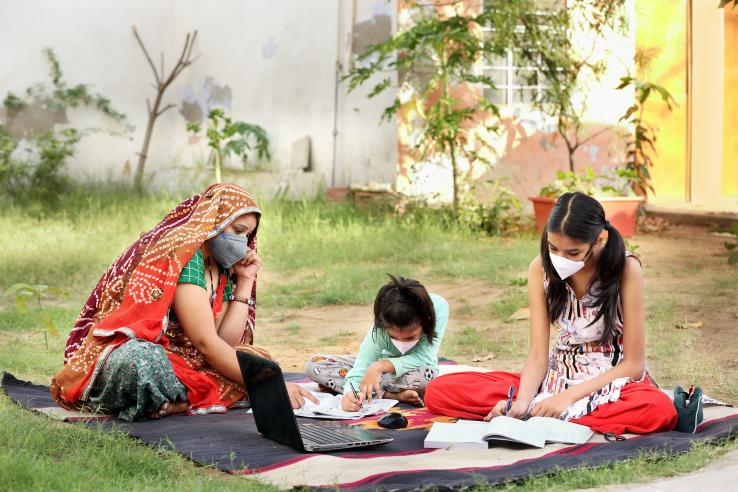Gendered Impacts of Covid-19: How Can Evaluations Inform Recovery and Resilience?
Partners:

The Covid-19 pandemic, like other major crises, has left already vulnerable groups such as women and children even more vulnerable. The pandemic has exacerbated challenges across various facets of social and economic life, such as domestic violence, female labour force participation, and access to healthcare, information, and financial protection, to name a few.
To ensure a holistic recovery to the Covid-19 crisis, it is essential to address these gender gaps. The first step is to be certain that we are accurately measuring the impacts and consequences of the crisis on women and other vulnerable groups. This is a key function of the Global Evaluation Initiative’s thematic focus on Gender and Inclusion.
This webinar will feature research on the gendered impacts of Covid-19 from across South Asia. Presenters will explore the evidence on the differential impacts of the pandemic from Bangladesh, India, and Indonesia, and how learnings from these evaluations can inform recovery and further enhance the socio-economic security of vulnerable women across contexts.
Register now >>>
This webinar is part of the Islamic Development Bank’s (IsDB) Evaluation Symposium 2022, centred around the theme of ‘Reshaping Evaluation Through the Lens of Recovery’. The symposium will bring together experts and practitioners to focus on the use of evaluation knowledge and tools to promote effective development and policy-making.
Who should attend
This webinar aims to address the questions encountered by researchers, governments, non-profit organisations, and donors engaged in ensuring that social policy is sensitive to the differential experiences of women and other vulnerable groups.
The panellists will discuss findings from descriptive and evaluation research conducted in South Asia during the last two years on critical questions around the social and economic impact of the pandemic on women, covering topics varying from intimate partner violence, female labour force participation, and social protection among others.
Register now >>>
Featured Speakers
Ammu Sanyal
Senior Research Manager
Initiative for What Works to Advance Women and Girls in the Economy (IWWAGE)
Kaliat Ammu Sanyal is a Senior Research Manager with IWWAGE. She has trained in the fields of Anthropology and Sociology. Ammu has extensive experience conducting research for development outcomes across India and the United Kingdom. Her areas of expertise and interest include rural development, collective action, social accountability, urban sociology and values based approaches. With a focus on research, application and evaluation Ammu has conducted research for the Values and Sustainability Research Group at The University of Brighton, The London International Development Centre, Participatory Research in Asia, INTACH and UNICEF among others. She is a founding member of the Portal for Shared Values, based at the University of Brighton.
Dr Prani Sastiono
Researcher, Institute of Economics and Social Research
Assistant Professor, Economics, Universitas Indonesia
Prani Sastiono is a researcher at the Institute of Economics and Social Research and an Assistant Professor at the Department of Economics at Universitas Indonesia. Her main focus of research includes economics in health, financial inclusion and digital finance, economic development and behavioral economics. She graduated from the National Institute of Political Studies in Tokyo with her PhD in public economics.
Dr Jennifer Seager
Assistant Professor of Global Health and Economics
George Washington University
Jennifer Seager is an Assistant Professor of Global Health and Economics at George Washington University. Dr. Seager is an applied microeconomist with research interests at the intersection of development and health. Some areas she has worked on include risk behaviors and STI rates among female sex workers in Indonesia, sexual and reproductive health among adolescents in sub-Saharan Africa, and the impact of local labor market conditions on household fertility decisions. She received her Ph.D. in the Department of Economics at the University of California, Irvine in 2016.
Lala Rukh Khan
Project Manager
Center of Economic Research in Pakistan (CERP)
Lala Rukh Khan is a Project Manager at the Center of Economic Research in Pakistan (CERP). She completed her MA in Demography from University of California, Berkeley on the Fulbright scholarship and a BSc (Hon) in Economics from LUMS. Her interests lie in development issues relating to gender and political economy.
Urvashi Wattal (Moderator)
Senior Policy and Training Manager
CLEAR/J-PAL South Asia
Urvashi Wattal is a Senior Policy and Training Manager at CLEAR/J-PAL South Asia. She supports the regional office’s efforts to promote evidence-based policymaking and build capacity for monitoring and evaluations. She currently leads J-PAL SA’s partnership with the Government of Odisha, which aims to institutionalise a culture of evidence-use in the state through research, policy and capacity building activities and also leads capacity building engagements with a range of stakeholders for CLEAR South Asia. Prior to this, she led J-PAL SA’s health sector and the Cash Transfers for Child Health initiative hosted by J-PAL SA.
Prior to joining CLEAR/J-PAL, she worked as an evaluation and research manager at Catalyst Management Services in India, working on evaluations in the areas of early marriage, HIV, agriculture, and education. Urvashi holds a Masters in Development Studies from TISS, Mumbai, and a Bachelors in Economics and International Studies from Macalester College, St. Paul, US.
For more information on this webinar, please contact Urvashi Wattal at [email protected].
